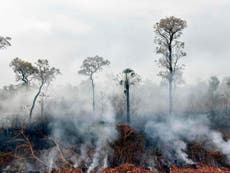Gene-editing cows could cut greenhouse gas emissions from their farts and belches, study suggests
There are around 1.4 billion cattle on the planet, making up the second-largest source of agricultural greenhouse gas emissions after food waste
Your support helps us to tell the story
From reproductive rights to climate change to Big Tech, The Independent is on the ground when the story is developing. Whether it's investigating the financials of Elon Musk's pro-Trump PAC or producing our latest documentary, 'The A Word', which shines a light on the American women fighting for reproductive rights, we know how important it is to parse out the facts from the messaging.
At such a critical moment in US history, we need reporters on the ground. Your donation allows us to keep sending journalists to speak to both sides of the story.
The Independent is trusted by Americans across the entire political spectrum. And unlike many other quality news outlets, we choose not to lock Americans out of our reporting and analysis with paywalls. We believe quality journalism should be available to everyone, paid for by those who can afford it.
Your support makes all the difference.Editing the genetic make-up of cows could significantly reduce methane from their belches and farts which contribute to the climate crisis, according to a new report.
Gene editing - making changes in the DNA sequence of living things, essentially tailoring characteristics - has developed rapidly in the past decade.
On Wednesday, American biochemist Jennifer A Doudna and French microbiologist Emmanuelle Charpentier were awarded the Nobel Prize for the pioneering CRISPR gene editing method which can change the DNA of animals, plants and micro-organisms with exacting precision.
A report published last month by nonpartisan science and tech think-thank the Information Technology and Innovation Foundation (ITIF) looked at how gene editing can tackle climate challenges, from optimising biofuels to improving the sustainability of fish and shrimp aquaculture and reducing methane emissions from rice paddies and cows.
ITIF’s report suggested that gene editing could lead to a 50 per cent improvement in agricultural productivity by 2050.
There are around 1.4 billion cattle on the planet, making up the second-largest source of agricultural greenhouse gas emissions (GHGs) after food waste.
Cow farts, and more importantly cow belches, release methane, a powerful GHG. In the first two decades after its release, methane is 84 times more potent than carbon dioxide, according to the Environmental Defense Fund.
Along with other grazing animals, cattle make up about 40 per cent of the annual global methane budget, according to the UN’s Food and Agriculture Organization.
Cows have become the unwitting target of a polarised climate debate. After the Green New Deal proposed by Representative Alexandria Ocasio-Cortez and Senator Ed Markey highlighted the impact of agricultural emissions in the climate crisis, a wave of hysteria ensued among Republicans and on conservative news outlets.
“They want to take away your hamburgers,” Sebastian Gorka, a former Trump adviser, told CPAC, while Fox News host Jeanine Pirro appeared in a segment with a vivid depiction of a cow’s fiery explosion destroying the earth.
Cows get nutrients by chewing cud, partly-fermented plant material, that is regurgitated from the first of its four stomach chambers prior to digestion. The methane that cows produce is mainly caused by microbes which live in a cow’s digestive tract rather than the cattle themselves, the ITIF report notes.
Gene editing and selective breeding could provide a long-term solution for those methane emissions.
A 2012 Australian study of more than 1,000 cattle from different herds found that among the quarter of a million different microbes in their digestive tracts, some 39 correlated with both productivity and methane generation.
“As the individual genes responsible for the presence of these microbes are identified, it will become straightforward to use gene editing to knock out those most responsible for high methane production bacteria or increase the expression of others that favour low-methane species,” the ITIF study says.
The results suggest that gene editing could dramatically reduce emissions from livestock and researchers are now seeking to extend the technique into sheep as well as cattle.
Such is the possibilities for tackling climate change, ITIF calls on governments to increase research and development and “eliminate unscientific regulatory burdens on gene editing”.
Val Giddings, senior fellow at ITIF, who co-authored the report, said in a statement: “While it is impossible to predict the extent to which gene-edited solutions will contribute to climate change mitigation, it is clear there is considerable potential.
“The gene editing toolkit is so powerful, its applications so widespread, and its development so rapid that we simply cannot yet conceive all the ways in which it will be used in the coming decades."
However the speed at which advances are being made has raised ethical questions. In 2018, there was outrage among the scientific community after a Chinese scientist He Jiankui announced that he had used gene editing to modify the DNA of twin girls before birth and make them resistant to HIV. He was subsequently jailed for three years.
Altering cows’ diets can also reduce methane emissions. Research conducted in 2018 found that adding seaweed to their feed could reduce emissions from cattle gut microbes by as much as 99 per cent.




Join our commenting forum
Join thought-provoking conversations, follow other Independent readers and see their replies
Comments